I recently met Aaron Morris, owner of Austin Urban Farm, at his home and farm, which is situated in a crowded neighborhood just east of I-35 in Austin. It was a slightly drizzly Texas morning when I stood on his stoop, ringing the bell, wondering if I had the right address. I checked my phone—few minutes early. I checked the address—had the right house. I started to call, and then I heard someone calling my name from across the street. I turned and saw Aaron waving as he exited the coffee shop directly opposite his house. He quickly bounded and skipped through traffic towards me. He was smiling widely, and he carried a cloth bag filled with contents I could not see.
I apologized for being early, but he waved off my apology and grabbed my hand. He shook warmly and vigorously and explained that he was across the street dropping off produce and picking up venison, which was currently nestled in his bag. Local hunters regularly drop off meat at the coffee shop for Aaron, sometimes as much as 60 lbs. at a time, and he turns the meat into sausage. In exchange for his work, the hunters let Aaron keep some of the finished sausages. He told me that the meat he just picked up was destined to become a holiday sausage: venison mixed with sage.
Aaron, his wife, and his son, live in a fairly innocuous house on the east side of downtown Austin. There’s nothing particularly unique about his neighborhood. His house is cute, but aside from the abandoned house on the left, his residence wouldn’t elicit a second glance if you drove past it.
But walk to the back, and it’s a different story. Aaron has maximized every inch of space his small plot of land offers. Having grown up on a 1,000 acre farm myself, I am utterly dumbstruck. There are rows and rows of heirloom vegetables inside a chainlink fence. Long boxes and flats of herbs and veggies are stacked haphazardly but growing prodigious amounts of produce. There’s a makeshift turkey-run, filled with beautiful heritage and hybrid turkeys, and a chicken coop, filled with happy, egg-laying chickens. He’s even converted an old washing machine into an industrial sized salad spinner by removing the agitator.
Aaron has also been farming the area behind the abandoned house. A neighborhood church owns the property, and they allow Aaron to use the backyard to grow crops and to let the turkeys forage. On the day that I visited, a group of workers showed up to tear the house down. The church informed Aaron that once the workers remove the house, they’ll let him farm the whole lot, which will drastically increase his yield.
As we walk around his property, Aaron tells me some of his story.
He didn’t start off as a farmer, urban or otherwise. In fact, he graduated college with a degree in sound recording. Aaron has worked with Willie Nelson. Common. Slipknot. Beyoncé. He’s worked at startup recording studios and at major studios, like Willie’s. He’s engineered recordings for musicians, audio books, and commercials. You name it, he’s done it.
To a Texas farmboy who’s always dreamed of hobnobbing with the rich and famous, I cannot believe he left the life of glamour for farming. I relate this fact to Aaron. He just kind of shrugs. “Yeah, but working with people like Beyoncé was 1% of the job. The industry is going extinct,” he tells me. “Unless you like to ride in a tour bus.” His face tells me he doesn’t.
But why farming, I ask him. “When’s the last time you actually bought a CD from a store?” he asks me. He smiles and asks his follow-up question: “When’s the last time you bought food?”
For Aaron, urban farming isn’t just a passion. It’s an economically sound passion. And he’s turning himself into a jack of all food trades in the Austin urban farming scene. He sells his produce to local chefs. He makes sausages for the local hunters. He’s currently apprenticing and working part-time at Salt & Time Butchershop to learn primary and secondary butchery. He grows a variety of produce, and he’s also raising chickens, turkeys, and occasionally, ducks.
He recently broke his hand while mountain biking, but luckily, he’s found an intern to help him with the work.
Currently, Aaron is raising turkeys for the The Homegrown Revival’s upcoming Thanksgiving Dinner (Shameless Plug Alert: Buy your tickets now!). He’s raising the commercially common hybrids, which are double-breasted turkeys, as well as the crème de la crème of turkeys: The Heritage.
Aaron takes on an air of melancholy when discussing the Heritages. He’s only raising them because The Homegrown Revival has ordered them for their dinner. He says the birds are labor-intensive and a challenge to raise. They’re foragers, and unlike the hybrid double breasted birds, they need a lot of ground. The Heritages need space to find insects, whereas the hybrids just sit around all day waiting to be fed.
Aaron calls the Heritage turkeys “problem solvers.” Since the hybrids have been genetically bred to maximize meat and minimize labor, they are docile to the point of lethargy and listlessness. They literally did not move during my entire visit. The Heritages, on the other hand, are inquisitive and curious. They roam around and check things out. And, according to Aaron, they are master escape artists. “If there’s a weak point anywhere in the fence, they’ll find it.” Thankfully, Aaron’s neighbors have grown accustomed to seeing him chasing turkeys around the eastside.
In addition to the space requirements, raising the Heritages also brings about an economic challenge. The Heritage does in fact produce a much tastier meat than a hybrid, but they’re active birds and don’t put on much weight, which means they don’t have as much meat. It costs Aaron about four times as much to raise a Heritage as it does a hybrid, and the Heritage will cost the consumer about $10 a pound for a two pound breast.
“Raising Heritages doesn’t make any economic sense. I’m just not sure they’re sustainable” he explains thoughtfully.
As I finished up my visit, Aaron explains that “When my wife was pregnant, I decided that my project was to make sure my son’s food was raised locally. I also like the idea that he’s going to get to grow up around animals.”
As I left, it made me feel good to know that there are people like Aaron living in Austin. He’s raising healthful, local food. But he’s also doing it in a pragmatic, economically sound way. We need more people in Austin, and around the country, like Aaron Morris.
Everything above this point happened several weeks ago. My plan was to write this article, and then attend The Homegrown Revival’s Know Your Grower event where Aaron was scheduled to be the grower on hand. The Homegrown Revival holds these events so people can meet with the urban farmers that grow and make our food. Put a face to the production, that kinda thing. I thought the visit would be a nice way to provide an epilogue.
I got to visit with Aaron at the event like I planned, but unfortunately, he didn’t have a lot of good news.
The church that was previously going to let him use their empty lot for farming has reneged on their offer after finding out they can make more money by creating an asphalt-covered parking lot. So not only will Aaron not get to use the whole lot as promised, he also won’t get to use the backyard like he has in the past, severely reducing his production and basically squeezing out any space for raising chickens and turkeys. Aaron doesn’t say this, but the cynic in me feels like he might have been playing caretaker to a plot of land that was always intended to become a parking lot.
“After I finish raising the turkeys for The Homegrown Revival, I’m probably going to have to get rid of all the birds” he tells me with a touch of sadness in his voice. “My wife and I really have to reevaluate what we’re going to do.”
It’s a hard life for a farmer. Even harder for an urban farmer. Austin is closing in, slowly devouring any undeveloped space to make room for more condos and apartments. Anything that can be taxed at a higher rate. The Homegrown Revival dinner in November might be the last time I have poultry raised by Aaron Morris. That makes me sad.
Sadder still is the prospect that despite Aaron’s hope, his son might not get to grow up around animals.
There has to be a way that urban farmers and commercial progress can live in harmony. Sadly, until we find a way to achieve that balance, people like Aaron and his family will be the ones to suffer.

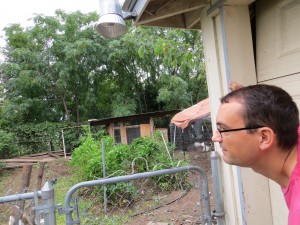
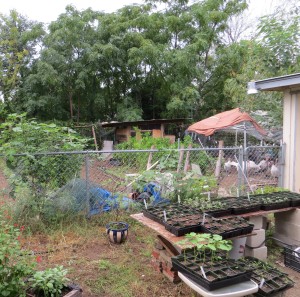

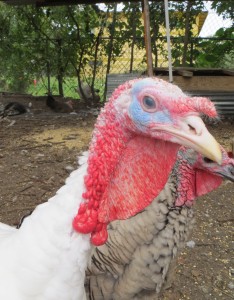
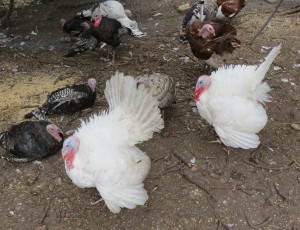
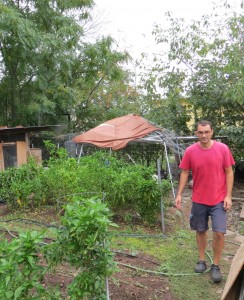
What an excellent post! Thanks for filling us in on what’s going on at the farm, and that’s sad to hear about them having to reevaluate. Seems like they are doing a lot of good work…
Pingback: » Thanksgiving with The Homegrown Revival Hyperliterature